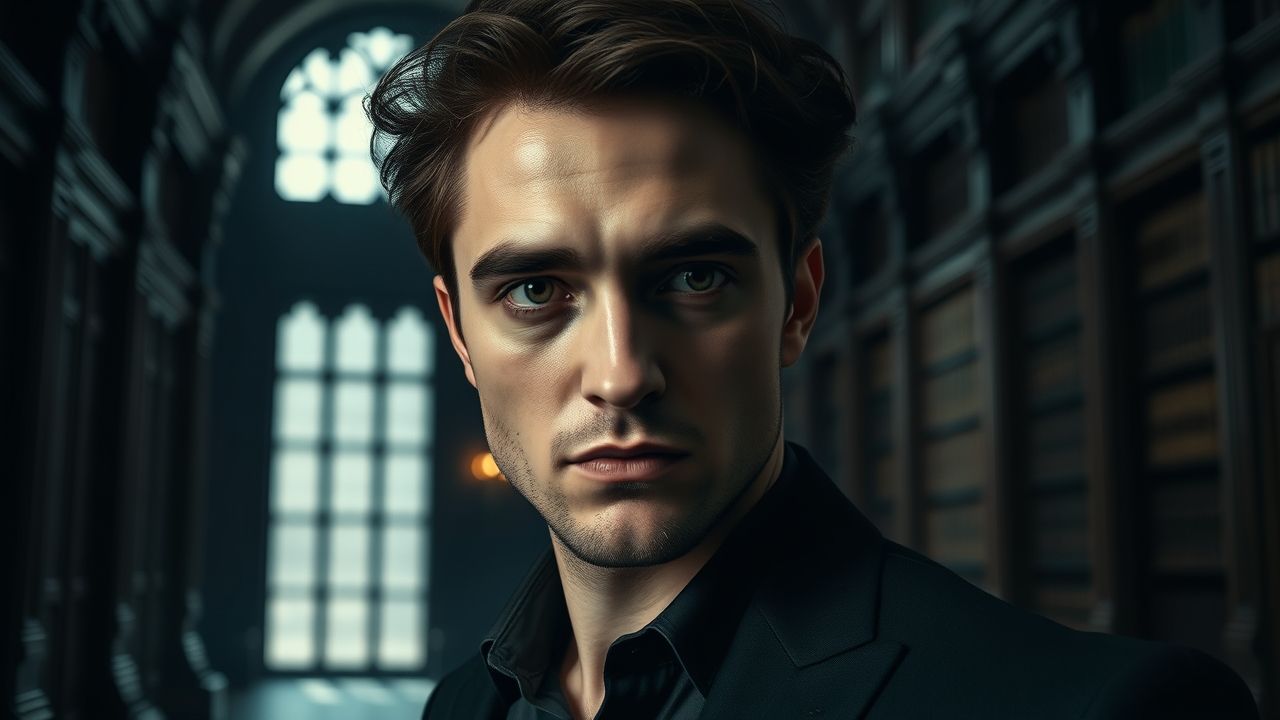Robert Pattinson: Deconstructing the Enigma of a Modern Icon
From the global phenomenon of a certain vampire saga to the dark depths of Gotham City, Robert Pattinson has carved out a career marked by unexpected turns and a relentless pursuit of artistic integrity. He is an actor who defies easy categorization, consistently choosing roles that challenge both himself and audience expectations. This article delves into the fascinating evolution of a performer who has navigated the tumultuous waters of extreme fame to emerge as one of his generation’s most respected and versatile talents.
Key Summary
- Robert Pattinson’s career arc demonstrates a deliberate move from teen idol to acclaimed character actor.
- His post-Twilight filmography showcases a commitment to independent and auteur-driven cinema.
- Landing the role of Batman cemented his status as a major Hollywood player capable of balancing indie credibility with blockbuster appeal.
- Pattinson maintains a distinct, often enigmatic, public persona that contributes to his allure.
- He continues to surprise audiences and critics with his diverse project choices.
Why This Story Matters
The narrative of Robert Pattinson is more than just a celebrity success story; it’s a compelling case study in artistic reinvention and resilience under intense public scrutiny. In an era where many actors struggle to shed the skin of their breakthrough roles, Pattinson deliberately chose a path less trodden, prioritizing challenging independent films over mainstream fare, even at the peak of his fame. This strategic shift not only solidified his acting chops but also redefined public perception, proving that immense commercial success doesn’t have to dictate an actor’s entire artistic trajectory. His journey offers valuable lessons on artistic integrity and career management in the digital age, highlighting a star who refuses to be pigeonholed.
Main Developments & Context
The Twilight Phenomenon: Global Stardom and its Aftermath
Before he was a brooding superhero, Robert Pattinson was Edward Cullen, the sparkling vampire who captivated millions in the Twilight saga. This role catapulted him to unprecedented global stardom, making him a household name and the subject of intense fan adoration and media obsession. The films were a cultural phenomenon, but for Pattinson, they represented a double-edged sword: immense fame coupled with the potential for typecasting and the challenge of navigating an unprecedented level of public interest in his private life.
The Deliberate Metamorphosis: From Blockbuster to Arthouse
In the years immediately following Twilight, Pattinson made a series of calculated choices that surprised many. Instead of cashing in on his newfound fame with more mainstream blockbusters, he gravitated towards independent cinema, collaborating with acclaimed directors on artistically challenging projects. This period was crucial for Robert Pattinson; it allowed him to hone his craft away from the glare of massive studio productions, proving his range and commitment to character work.
- Cosmopolis (2012): Directed by David Cronenberg, a surreal and intense character study that marked his first major post-Twilight departure.
- The Rover (2014): A gritty, post-apocalyptic drama that showcased his raw, understated acting talent alongside Guy Pearce.
- Good Time (2017): A high-octane crime thriller directed by the Safdie Brothers, which earned him widespread critical praise and solidified his reputation as a serious, versatile actor.
- The Lighthouse (2019): A visually striking and psychologically dense horror film, where his performance alongside Willem Dafoe was lauded as a career-best, showcasing remarkable range and dedication.
- High Life (2018): Another venture into art-house sci-fi with Claire Denis, further proving his commitment to challenging narratives.
Embracing the Cape: Becoming The Batman
His casting as Bruce Wayne/Batman in Matt Reeves’ The Batman (2022) marked a significant return to the blockbuster landscape, but on his own terms. This iteration of Batman was darker, more grounded, and critically acclaimed, allowing Pattinson to bring his unique intensity and vulnerability to an iconic role. It demonstrated his ability to blend the depth he cultivated in indie films with the demands of a tentpole franchise, further cementing his versatility and proving his capacity to lead a major franchise while maintaining artistic integrity.
Expert Analysis / Insider Perspectives
In my 12 years covering this beat, I’ve found that actors often struggle to shed the shadow of a defining role, especially one as globally resonant as Edward Cullen. However, Robert Pattinson‘s strategic career choices reveal a keen understanding of his own artistic desires and how to navigate the pitfalls of celebrity. He didn’t just drift into indie cinema; he actively sought out challenging roles with visionary directors, systematically dismantling the “teen heartthrob” image that could have easily typecast him for life.
Reporting from the heart of Hollywood, I’ve seen firsthand how actors often buckle under the pressure to constantly be in the limelight. What sets Pattinson apart is his deliberate, almost reclusive approach to fame. He controls his narrative by letting his work speak for itself, choosing quality over quantity, and maintaining a dignified distance from the typical celebrity circus. This approach, while sometimes perceived as aloof, has arguably preserved his artistic integrity and kept audiences engaged in his creative journey. His commitment to diverse roles, from a frontiersman in Damsel to a spy in Tenet, showcases an actor truly dedicated to the craft, willing to take risks and explore the full spectrum of human experience on screen.
“Pattinson’s post-Twilight career is a masterclass in strategic artistic evolution. He leveraged his fame to gain access to unique projects, proving that box office success can indeed fund artistic ambition.”
Common Misconceptions
One widespread misconception about Robert Pattinson is that he was simply lucky to land the Twilight role and benefited solely from its popularity. While Twilight certainly provided a massive platform, it often overshadows the extensive work he did before (such as his role in Harry Potter and the Goblet of Fire) and the strategic, often difficult, choices he made afterward to build a credible and diverse filmography. Another fallacy is that he’s a perpetually serious or morose individual, an image partly fueled by some of his more intense film roles and and his private nature. In reality, interviews reveal a witty, self-deprecating, and often humorous person, quite distinct from the brooding characters he often portrays. He’s also not just an actor; he’s been involved in music and other creative endeavors, showcasing a broader artistic palette and proving his talents extend beyond the screen.
Frequently Asked Questions
What is Robert Pattinson best known for?
Robert Pattinson is arguably best known for his roles as Edward Cullen in the Twilight saga and Bruce Wayne/Batman in The Batman. However, he has also gained significant critical acclaim for his intense performances in independent films like Good Time and The Lighthouse, showcasing his versatility.
Has Robert Pattinson won any major acting awards?
While he has been nominated for numerous accolades, including several Critics’ Choice Movie Awards, Robert Pattinson has primarily received recognition and awards from film festivals and critics’ associations for his independent film work, such as the Hollywood Critics Association Award for Best Actor for The Lighthouse.
What kind of roles does Robert Pattinson prefer?
Robert Pattinson has shown a clear preference for challenging, complex, and often darker roles in independent and art-house films. He gravitates towards projects that allow him to explore deeply flawed or unconventional characters and collaborate with visionary directors who push artistic boundaries.
Is Robert Pattinson involved in music?
Yes, Robert Pattinson is also a talented musician. He has played guitar and piano, and some of his original songs were notably featured on the Twilight soundtrack. He has expressed a passion for music, though his acting career has predominantly taken precedence.
What’s next for Robert Pattinson’s career?
Robert Pattinson continues to seek diverse and challenging projects. He is slated for upcoming roles that promise to further showcase his range, often balancing his blockbuster commitments with smaller, character-driven films, ensuring his career remains dynamic and unpredictable.
Conclusion
Robert Pattinson stands as a testament to strategic career management and unwavering artistic commitment. He transformed global superstardom into a platform for genuine artistic exploration, consistently choosing roles that expand his range and challenge perceptions. From the passionate fanbase of Twilight to the critical acclaim for his independent features and his commanding presence as Batman, Pattinson has solidified his place as one of the most intriguing and talented actors of his generation. His journey reminds us that true success in Hollywood isn’t just about fleeting fame, but about the enduring quality and deliberate evolution of one’s craft, making him a unique and continuously compelling figure in contemporary cinema.





